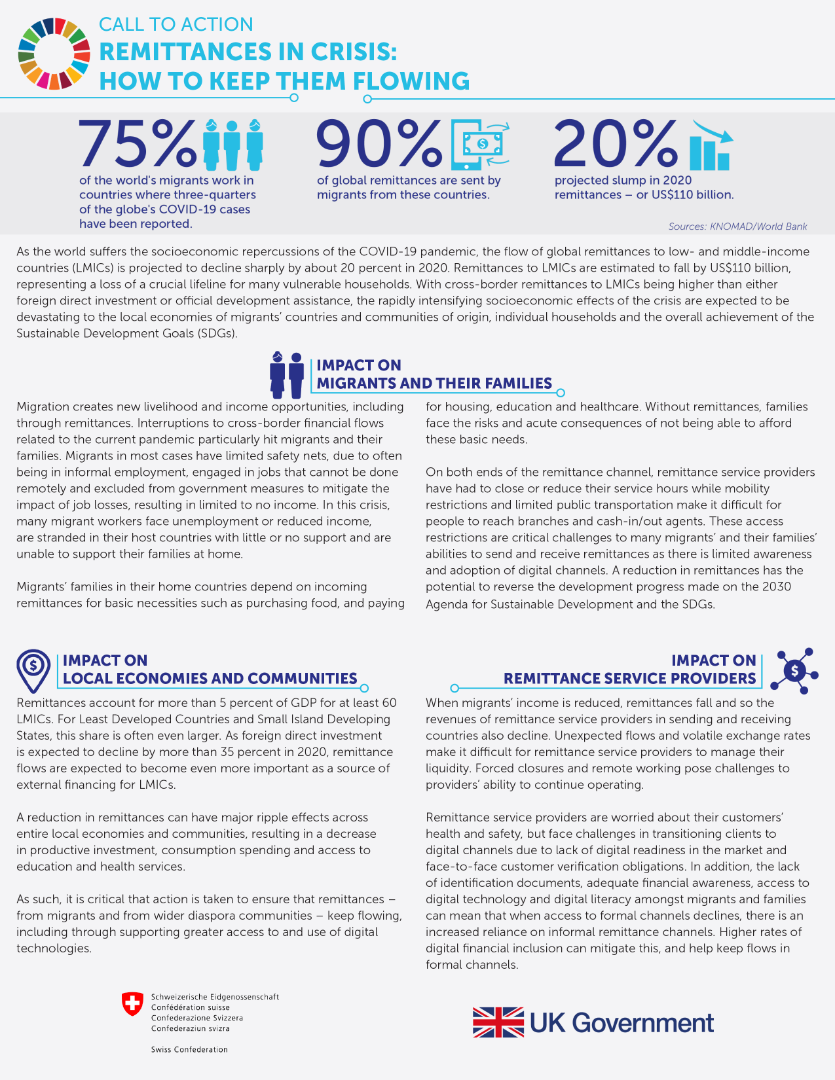Publication
COVID-19 changing the landscape for migrants and remittances
-
June 19, 2020
Summary
The pandemic’s effect on the flow of global remittances sent by migrants back home to low- and middle-income countries (LMICs) is projected to be one of sharp decline – a fall by about one fifth this year. The estimated 20 per cent slump represents US$ 109 billion in 2020. The hardship of COVID-19 felt by migrants in a loss of wages and employment – often without government safety nets in the countries that host them – is a large part of this crisis in remittances.
The decline also results from a host of issues caused by the coronavirus for the services that migrants use to send money home – including the restrictions placed on remittance services providers (RSPs) and their agents.
The decline to the flow of remittances represents the loss of a crucial financing lifeline for many vulnerable households. And the rapidly intensifying economic effects of COVID-19 have a severe impact in migrants’ countries of origin, but also the local economies of their host communities.
The United Nations Capital Development Fund (UNCDF) collaborated with the International Association of Money Transfer Networks (IAMTN) to gather insights from RSPs on the specific nature of the pandemic’s impact on migrants and remittances. As well as highlighting the challenges faced by migrants and RSPs, the providers’ responses also reveal some of the initiatives they are undertaking to address these. Finally, the insights also give reflections on the measures that can be put in place by policymakers and regulators.
The research and publication is supported by the Swiss Agency for Development and Cooperation (SDC) and the Swedish International Development Cooperation (Sida). The results, which are summarized in the following slides, are also overviewed in three briefs that may be downloaded using the links at the top-right of this page.
Remittances in Crisis: How to Keep Them Flowing
The United Nations Capital Development Fund and the United Nations Development Programme have announced their joint support for a Member State-led initiative spearheaded by the Government of Switzerland and the Government of the United Kingdom to call on policymakers, regulators and remittance service providers to improve migrants’ access for sending and receiving remittances, and to reduce transfer costs during the ongoing pandemic of COVID-19 outbreaks. Read more here.
Request for Applications: Inclusive Digital Solutions to Support Migrants and Remittances
Amid the COVID-19 crisis, UNCDF is seeking partners to respond to the increased challenges faced by migrants and their families to send and receive remittances. The goal of this initiative is to ensure that migrants and their families are supported, through continued access to affordable and accessible remittance channels. UNCDF will support partners in the development or expansion of digital remittance channels, strengthening digital use-cases, and developing products or services that strengthen the financial resilience of migrants and their families.
Learn more:
BLOG: Nepal faces a crisis as COVID-19 stems the flow of remittances
The World Bank projects that remittances to Nepal will slide by 14 percent this year—not the biggest slump in the region, but remittances represent more than 25 percent of the country’s economic output. Economic security of migrants, their families, and national economies like Nepal’s can be assured through better access to digital and financial solutions.
On the International Day of Family Remittances, Ali Akram, UNCDF’s Lead Digital Specialist in Nepal and Andrew Caruana Galizia from the World Economic Forum explore the impact of COVID-19 on remittances in Nepal and potential actions.
Read the full blog here.
BLOG: Bangladesh faces a crisis in remittances amid COVID-19
In Bangladesh, coordinated efforts should be made between public-sector institutions and remittance services providers to reach out to migrants and their families to help them open bank accounts, and to improve access to digital solutions.
On the International Day of Family Remittances, Amil Aneja, UNCDF’s Lead Specialist on Migration and Remittances, and Sheikh Tanjeb Islam from the World Economic Forum explore the impact of COVID-19 on remittances in Bangladesh and potential actions.
Read the full blog here.
BLOG: COVID-19 exposes opportunities as well as vulnerabilities for migrants’ remittances to Senegal
The coronavirus pandemic has caused remittances back into Senegal to dry up as COVID-19 has taken grip and lockdown measures have affected the migrant workers who normally send the money from mostly European countries such as France, Italy and Spain.
On the International Day of Family Remittances, Serge Moungnanou, Digital Finance Specialist and Amil Aneja, Lead Specialist, Migration and Remittances from UNCDF explore the impact of COVID-19 on remittances in Senegal and potential actions.
-
Language:
-
Publish Date:May 10, 2020
